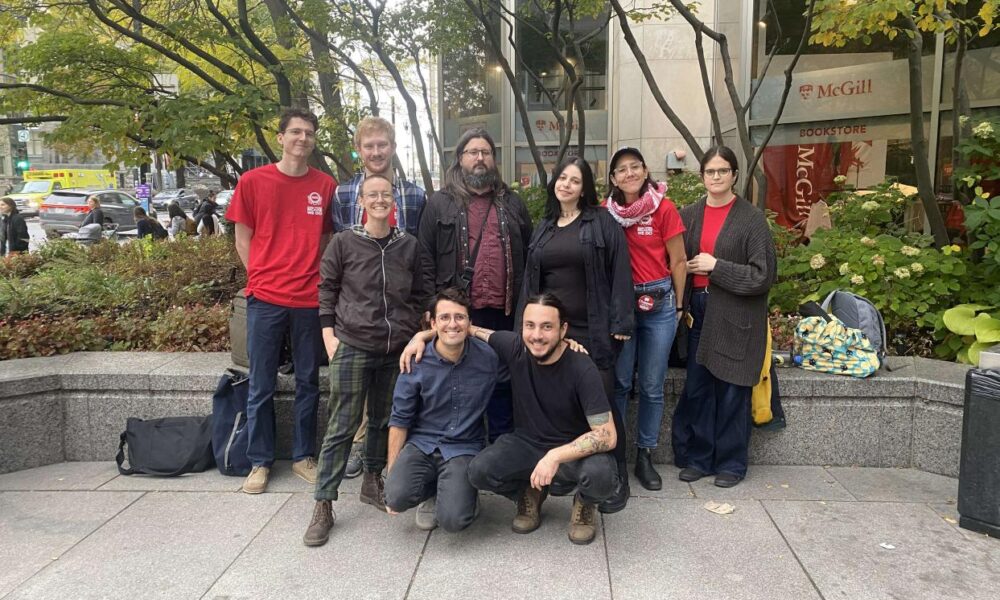A second round of negotiations between the McGill administration and the Association of Graduate Students Employed at McGill (AGSEM) took place on Oct. 19. According to the union’s press release, the four-hour session was focused on aligning the new contract with McGill’s policies on intellectual property, labour relations, and university governance. The meeting also touched on establishing timelines for addressing employee grievances.
The collective agreement between the university and the union expired on Jul. 31, and the sides first exchanged proposals for a new agreement on Sept. 21. As expressed in their “No More Free Hours” campaign, the union’s core demand is to end the time teaching assistants (TAs) spend reading course material and sending emails that is not recorded or paid. The union also aims to establish better conditions for McGill TAs in terms of wages, healthcare, and methods of preventing sexual harassment. The group alleges that McGill steals $1 million each year in TA wages.
The early negotiation talks have been around issues other than wages, including job security and ensuring that TAs have access to TA jobs. Another bargaining committee member, Nada El Baba, a second-year biology Ph.D. candidate, explained in the union’s press release that “information accessibility” was additionally discussed at the session.
“TAs usually do not know the number of students enrolled in classes which they apply to,” El Baba wrote. “This is particularly relevant to those who teach labs where they are responsible for not only students’ education but also their physical safety around dangerous materials. TAs have the right to know what they are signing up for to make the best decisions for themselves and their students.”
In addition to the previously determined topics of discussion, the Quebec government’s decision to raise tuition for out-of-province students could impact negotiations as James Newman—the Vice President of Communications for the Association of McGill University Support Employees (AMUSE)—explained.
“I think McGill is going to be, as usual, very austerity-minded and not want to really offer much in terms of wages and benefits, particularly considering the pressure caused by the new decision,” Newman said. “They’re probably going to say that they’ve got new pressures, that they’re going to cut costs.”
Thomas Chalmers, the president of the McGill University Non-Academic Certified Association (MUNACA), said that MUNACA was “deeply concerned” that McGill may use the tuition hike as an excuse to refuse wage increases or justify wage decreases.
Even without added pressures, negotiations over collective agreements can be an arduous process according to Chalmers. In an email to The Tribune, Chalmers explained that, when MUNACA negotiated their collective agreement—a two-year process that ended in 2022—the union found the McGill administration resistant to change.
“Our biggest challenges about our negotiations were the stubbornness, interminable delays, and resistance to change we met at a great deal of our demands, whether that was non-monetary or monetary,” Chalmers wrote. “At the time we were negotiating we kept hearing the same replies: Workday [McGill’s employee management software] cannot do that and we have no appetite for that, were often repeated answers.”
Sean Cory, president of the Association of McGill University Research Employees (AMURE), said in an email to The Tribune that while the uncertain financial situation could impact negotiations, wages do not usually come from tuition or government funds, but rather from research funds.
Cory also said that his membership was happy with the results of their negotiations and that negotiations for good collective agreements take time.
“The more gains you want to make, the longer negotiation takes,” Cory wrote. “It takes time to actually negotiate and discuss the issues, […] it takes time to hold out for the positions and improvements that you want in your collective agreement.”
AGSEM and McGill’s next bargaining sessions are scheduled for Nov. 9 and 22.







